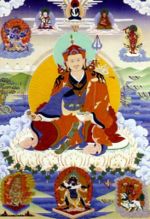Rigpa Shedra Wiki: Difference between revisions
Jump to navigation
Jump to search
mNo edit summary |
No edit summary |
||
| (41 intermediate revisions by 5 users not shown) | |||
| Line 1: | Line 1: | ||
[[Image: | [[Image:Khenpo Namdrol prayer.jpg|thumb|250px|[[Khenchen Namdrol]], who oversees the Rigpa Shedra in Nepal]] | ||
{| style="width:280px; border:none; background:none;" | |||
| style="width:280px; text-align:center; white-space:nowrap; color:#000;" | | |||
<div style="font-size:162%; border:none; margin:0; padding:.1em; color:#000;">Welcome to the [[Rigpa Shedra]] Wiki,</div> | |||
<div style="top:+0.2em; font-size:95%;">an online encyclopedia of ''[[Tibetan Buddhism]]</div> | |||
<div id="articlecount" style="width:100%; text-align:center; font-size:85%;">We currently have [[Special:Statistics|{{NUMBEROFARTICLES}}]] articles</div> | |||
|} | |||
You can '''search the site''' using the upper ''search'' box to the right. Additionally you can select from some of the '''main categories''' included in the encyclopedia: | |||
You can '''search the site''' using the upper ''search'' box to the | |||
:*[[ | :*[[:Category:Buddhas_and_Deities|Buddhas & Deities]] | ||
:*[[:Category:Enumerations|Enumerations]] | |||
:*[[:Category:Contemporary_Teachers|Contemporary Teachers]] | |||
:*[[:Category:Historical_Masters|Historical Masters]] | |||
:*[[:Category:Prayers_and_Practices|Prayers & Practices]] | |||
:*[[:Category:Schools_and_Lineages|Schools & Lineages]] | |||
:*[[:Category:Texts|Texts]] | |||
You might also want to subscribe to the '''recent changes''' to keep track of all the additions to the site as they happen. | You might also want to subscribe to the '''recent changes''' to keep track of all the additions to the site as they happen. | ||
| Line 14: | Line 21: | ||
:*[[special:Recentchanges|Recent changes]] | :*[[special:Recentchanges|Recent changes]] | ||
*''If you are new to Wikis, consult the [[Help]] page.'' <br> | |||
'' | ==Featured Pages== | ||
== | {| class="wikitable" style="color:black;background-color:#f4f4f4;" cellspacing="5" border="0" text-align:left,bottom" | ||
|+ | |||
|- | |||
| [[Image:Guru rinpoche.jpg|150px]] || style="background-color:#f7f7f7" cellpadding="5" | | |||
*'''[[Padmasambhava]]''' (Skt.), or '''Padmakara''' (Skt. ''Padmākara''; Tib. ''Pemajungné''; [[Wyl.]] ''pad+ma 'byung gnas'') means ‘Lotus-Born’, which refers to Guru Rinpoche's birth from a lotus in the land of [[Oddiyana]]. '''Guru Rinpoche''', the ‘Precious Master’, is the founder of [[Tibetan Buddhism]] and the [[Buddha]] of our time. Whereas Buddha is known primarily for having taught the teachings of the [[sutra]] vehicle, Padmasambhava came into this world, and to Tibet in particular, in order to teach the [[tantra]]s. While [[Buddha Shakyamuni]] exemplifies the buddha principle, the most important element in the [[sutrayana]] path, Padmasambhava personifies the [[guru]] principle, the heart of [[Vajrayana]] Buddhism, and he is therefore known as the ‘second Buddha’ (Tib. ''sangyé nyipa''). ([[Padmasambhava|Read more...]]) | |||
*[[Shedra MP3 Library]] | |||
|} | |||
Latest revision as of 14:41, 25 March 2015

|
Welcome to the Rigpa Shedra Wiki,
an online encyclopedia of Tibetan Buddhism
We currently have 11,510 articles
|
You can search the site using the upper search box to the right. Additionally you can select from some of the main categories included in the encyclopedia:
You might also want to subscribe to the recent changes to keep track of all the additions to the site as they happen.
- If you are new to Wikis, consult the Help page.
Featured Pages
 |
|